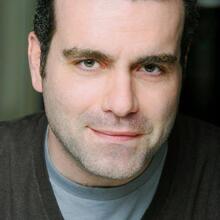Twelve years ago, I published my first (and only) book, What’s So Funny About Faith? A Memoir at the Intersection Between the Holy and Hilarious, a hybrid memoir/cultural critique from an Ignatian perspective about the role humor can play in the life of faith. It was a landmark moment in my career, and the book follows me everywhere…or at least when I’m at my parents’ house in suburban Chicago, where you’re bound to stumble upon at least one of the multiple copies of the book they bought, now functioning as a coaster for a cup of coffee or a cold drink.
I mention this not to boost sales on a book that still ranks amongst the top 15,000 Catholic books on Amazon (take that, James Martin, S.J.!) but rather because of Pope Francis’ recent meeting with more than 100 of the world’s most prominent comedians (including the aforementioned Father Martin). That event at the Vatican offered me an opportunity to reflect on how vastly different the world is today than it was in 2012, when my book was published, and why more than ever, a sense of humor remains fundamental for those of us attempting to navigate a faith-filled existence in the upside-down world in which we now find ourselves.
In my book, I focused on the importance of humor as a means of catharsis, as well as its use as a tool for social critique. At the time I wrote that, mid-Obama administration, there was already a rapidly increasing divide within the American political spectrum, though I doubt anyone could have predicted the sharp turn it would take over the next decade. At the time, “The Daily Show,” and “The Colbert Report” (remember when he had niche shows on basic cable?) were taking humorous political and social critiques in the media to another level. Certainly, making fun of politicians has been around at least since Aristophanes wrote “Lysistrata,” but “The Daily Show” and “The Colbert Report” were, for many Americans, replacing the nightly news as their primary source for information.
All these years later, things have plateaued within the realm of humor and socio-political criticism in the media. “The Daily Show” remains the same, but Colbert set out for the economically greener pastures of network late-night television and within these new horizons, he adopted a much less pointed focus on the socio-political element of his past. John Oliver is perhaps the best in the business with his politically satirical “Last Week Tonight,” now in its 11th season on HBO, and pre-pandemic, the impact of the show was palpable.
But aside from Oliver, political and social satire in the mainstream media seems to be treading water.
And maybe that’s OK. Maybe right now, in these incredibly polarizing times, it’s more important to laugh from our belly than from our brain. Perhaps too much political satire on our screens has made us all a bit too critical and too clever about the “other guy” across the aisle. Indeed, maybe catharsis is more important than critique when it comes to humor right now, and maybe it’s better to relax and laugh with feel-good funny shows like “Ted Lasso” and “Abbott Elementary.”
But if we’re finding it hard to laugh at anything these days, at least we should be able to laugh at ourselves. If we can’t, we need to learn. I bring this up in light of the multiple verbal miscues Pope Francis made in public over the past few months. Not because I want to condemn him, and not as my good friend, Joe Hoover, S.J. says, to “popesplain” him, but to use him as an example of the radically human tendency we all have to contradict ourselves and offend those around us—while also being a generous, loving person, who at the end of the day is trying their very best to serve Christ.
Self-reflection is fundamental to the spiritual life, and frequently the easiest way through the crucible of self-awareness and the recognition of our sinfulness is through humor. We need to laugh at our shortcomings and foibles and in doing so move a bit closer to forgiving ourselves for being, well, human.
Because if we cannot forgive ourselves, how can we expect to forgive anyone else? And if that’s the case, there goes this whole Christian project. And that is no joke.







